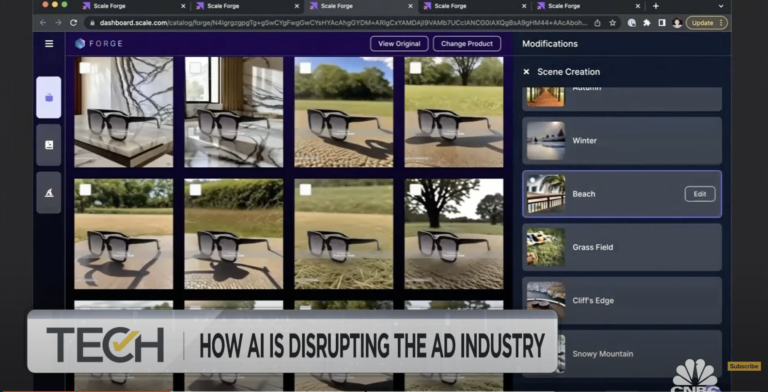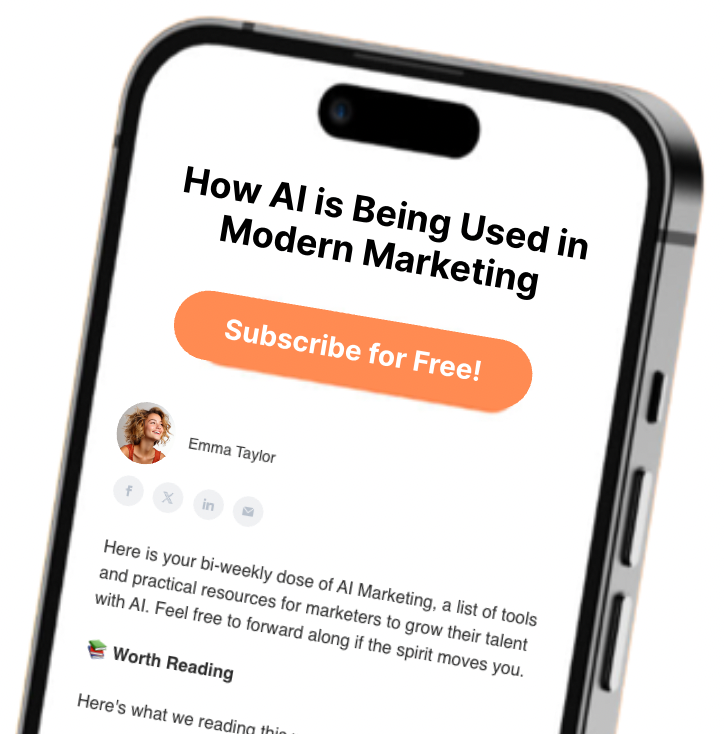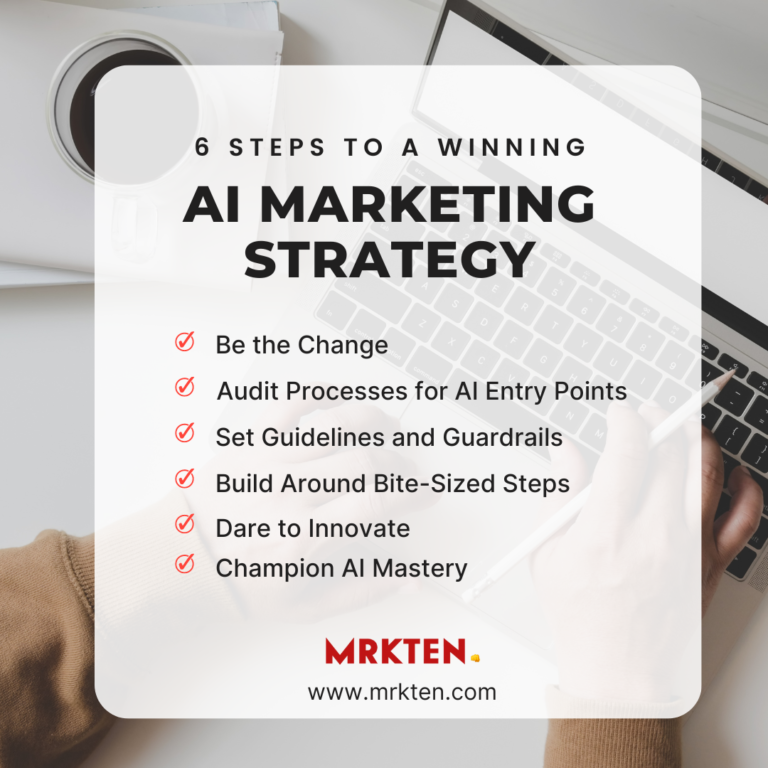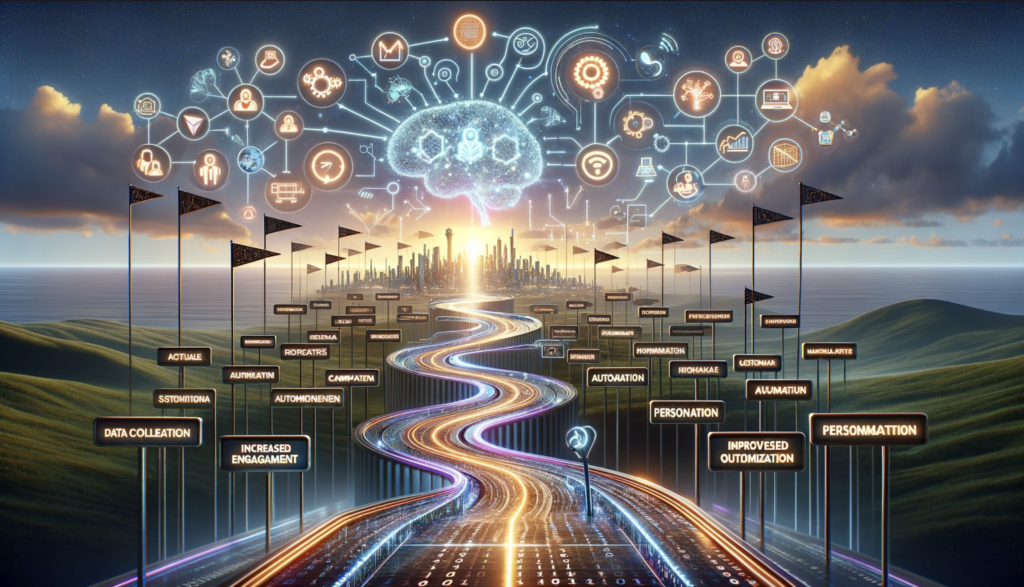Now is the Time to Create an AI Marketing Strategy
Beware the complacency trap – artificial intelligence is a seismic shift in customer behavior and requires unprecedented changes in marketing strategies. If you don’t have an AI marketing strategy and plan, you’re late to the game. Over 90% of marketing teams already report some form AI being integrated into their marketing practices, so it’s time to start using AI strategically in your marketing.
You might be thinking, “I’ve already got a marketing plan in place, so why bother with an AI marketing strategy?” And sure, we’ve been dabbling with AI for a while now, using predictive models to score leads more effectively and algorithms to personalize content. But, we have reached a significant tipping point and the most challenging adjustment is transforming the mindset of marketing leaders to embrace the opportunities and mitigate the potential risks presented by AI for marketing.
Just take a second to consider the huge changes in B2B marketing paradigms over the past two decades.
When the Internet went mainstream, marketing leaders pivoted from print to digital, navigating a global, 24/7 audience landscape. The rise of digital advertising pushed marketing teams to become data-savvy, focusing on precision targeting through understanding keywords to optimize conversion rates. Social media platforms made marketing leaders master two-way conversations, manage real-time public feedback, and create shareable content, making brands more human. Smartphones pushed location-based marketing with optimization for small screens and instant, actionable experiences that both target the audience as well as where they are and what they’re doing.
Each wave has brought challenges and opportunities, requiring not just a change in tools and strategies but a sea change in outlook. Making the mental leap in time has separated the winners from the marketing losers.

How to Prepare for AI in your Marketing Strategy
AI in B2B marketing shifts the focus from identifying and targeting buyers to predicting and shaping their behavior through personalized experiences and data-driven insights at scale. Fundamentally transforming how marketers connect with, understand, and win customers. Marketing executives need a fundamental shift in how they think about and engage with consumers to build an effective AI marketing strategy.
Here are the big three paradigm shifts you need to incorporate into your AI marketing plan.
We call this the 3C’s of AI marketing strategy –
- Team Capacity
- Customer Journey
- Creativity
Capacity: Rethink Marketing Team Structure and Skills
As we dive into a future with AI knocking on our door, it’s clear marketing efforts need to gear up for some big changes in their digital marketing strategy. Marketing leaders need to take stock of the changing digital landscape to prepare their teams for the AI marketing era.
First up, digital know-how is key. It’s not just about being tech-savvy anymore. Everyone in the team needs a solid grip on what artificial intelligence, machine learning, natural language processing (NLP) and deep learning are. More importantly, they need to understand how AI-powered marketing tools can be their allies, boosting their efficiency and making their jobs easier. AI already powers everything from product recommendations, dynamic pricing, churn prediction, search engine optimization to engaging content. Imagine a world where digital marketers use AI for the analysis of complex customer data, turning it into a goldmine for targeting strategies, marketing messages, and revenue growth. That’s where we’re headed.
Next, there’s a fine line between what needs the human touch and what AI can handle like a champ. This skill—to tell apart tasks that need creative human insight from those that can be automated—is going to be gold. Think about it: AI might crunch numbers and spot trends, but crafting a story that tugs at the heartstrings? That’s our job. It’s about blending AI efficiency with human creativity for marketing content and campaigns that truly stand out.

And finally, the way marketing teams work together is about to get a major upgrade. AI is a game-changer, making marketing tools and talents accessible across the board. Suddenly, writing a killer blog post, designing an eye-catching ad, or conjuring up creative visuals isn’t just for the specialists. This democratization means marketing teams need to rethink how to collaborate and redefine roles, embracing a more integrated approach to marketing tasks. Picture a brainstorming session where AI spits out initial ideas and everyone, regardless of their official role, chips in to polish and perfect. That’s the future of collaboration in marketing with AI-powered tools generating valuable insights and ideas for data-driven decision-making.
Stepping into the AI-enhanced marketing world is about upping digital skills and know-how, honing the team’s judgment on when to let AI take the wheel, and fostering a collaborative spirit that breaks down silos. AI is a new marketing tech stack fueling actionable insights and automated decisions. It’s an exciting time to be in marketing, don’t you think?
Far-Reaching Upgrade to the Customer Journey
Conversational interfaces are set to redefine the customer experience, elevating the standard of interaction between consumers and companies. As this technology advances, customers will naturally come to expect more sophisticated, rapid, and engaging communication with businesses.
Imagine your customer is browsing online, and instead of the usual click-through ads or video pop-ups, you bump into a chatbot right in the ad space. This isn’t your average chatbot, though. It’s like having a chat with a friend who knows exactly what you like, offering personalized suggestions and advice on the spot. It’s all about making their experience as smooth and tailored as possible. Engaging customers in meaningful dialogue, tailoring responses and recommendations to each individual customer’s needs and preferences, much like a personal shopping assistant who remembers every interaction.

Customer service interactions are also poised for a transformation. Responses to inquiries will go beyond providing mere information; they will aim to resolve any issues within a single exchange. This means that a question about a product’s features could lead to an instant, comprehensive solution, such as a personalized recommendation, a tutorial video, or even a direct link to purchase, all seamlessly integrated within the conversation. It will make every customer feel like the VIP in a one-on-one personalized conversation.
Marketers must brace for this shift by developing more intuitive, AI-powered conversational experiences that can understand and anticipate customer needs. They should explore and invest in AI technologies that can analyze customer data in real-time, enabling next-level interactions. And it’s not just about the tech; it’s about using the insights it gives us to be more human, more connected. We’re heading towards a future where the blend of tech smarts and human touch creates experiences that are not just satisfying, but downright delightful.
Creative: New Boundaries of Storytelling, Personalize Content Like Never Before
AI tools for digital marketing aren’t just about crunching numbers or automating mundane tasks; they’re becoming the creative partners we didn’t know we needed. In four pivotal areas where AI will make waves for creativity.

Enjoy reading this blog? Try
Marketer &
Machines Newsletter
Marketing + AI. Learn expert tips, tools, prompts, and how-to’s for marketers to earn more with AI.
✓ Subscribe now to get a free Curated List of the top AI tools and platforms!
✓ Opt-out at any time
✓ Delivered bi-weekly
AI marketing will unleash personalized creative at scale. AI is empowering marketers to deliver highly personalized content to massive audiences with unprecedented precision. Imagine a world where every ad, email, or social post you create is tailored to the individual preferences of each viewer. AI analyzes consumer data in real-time, enabling marketers to craft personalized messages that speak directly to the unique desires and needs of their audience, making broad-scale campaigns feel intimately personal and drive customer satisfaction.
AI democratizes creative production. With AI, the tools and capabilities once reserved for large corporations with deep pockets are now accessible to all. Small businesses or small teams can leverage AI-driven platforms to design professional-grade visuals and compelling videos as well as an engaging content generator without the need for a large creative team. This democratization of creative production levels the playing field, allowing more brands to compete with captivating content that stands out.
It will also fuel data-driven creative decisions and collaboration. AI’s ability to sift through and make sense of vast datasets with meaningful insights is a boon for creative teams. Marketers can now make informed decisions based on real-time insights, from identifying trending topics to understanding nuanced audience behaviors. This data-driven approach fosters a more collaborative environment, where creative and analytical minds come together to refine strategies, ensuring that every piece of content is both imaginative and effective.
Lastly, and probably the most dramatic is expanding the boundaries of storytelling. AI is pushing the limits of traditional marketing storytelling. By analyzing what content performs well and why AI can suggest new themes, formats, and narratives that might have been overlooked. Marketers can experiment with innovative storytelling techniques, such as interactive videos or augmented reality experiences, to captivate audiences in ways previously unimaginable. This exploration into new storytelling territories not only engages customers but also sets a brand apart as an industry innovator.
B2B marketing executives will need to change their paradigm on what is creatively possible for their campaigns and for their budgets and think bigger. By embracing personalized creative at scale, democratizing production, making data-informed decisions, and pushing storytelling boundaries, marketers can prepare their teams for a future where AI and creativity coexist, driving unprecedented engagement and brand loyalty.
6 Steps to Create an AI Marketing Plan
Once marketing leaders embrace the right mindset toward AI, the path to crafting an effective AI marketing strategy becomes clearer and much more navigable. It’s like having the right map in hand before embarking on a journey. You can identify where AI fits best within your marketing landscape, ensuring it serves to enhance, rather than complicate your goals.
This involves evaluating current marketing processes, pinpointing areas ripe for AI integration, setting clear guidelines for what they wish to achieve, and building the skills your team needs. A well-thought-out AI marketing strategy enables you to stay ahead of the curve, driving innovation and delivering value in ways previously unimagined.

Here are six practical steps to use as a framework and starting point to realize AI’s enormous potential for marketing.
1. Be the Change
Change starts at the top. As a marketing leader, your openness to exploring and adapting to AI technologies sets the tone for your entire team. Encourage curiosity, facilitate workshops, and share success stories of AI in marketing to ignite enthusiasm and dispel fears about automation replacing jobs. It’s about enhancing your team’s capabilities, not diminishing their importance. Here are five practical steps to create a winning AI Marketing strategy.
- Analyze: Understanding how AI can impact your specific market and marketing ecosystem. Invest in learning about tools, strategies, and examples.
- Align: Engage and consult with your legal and security teams to ensure that your AI initiatives remain compliant with regulations
- Partner: Identify and engage with AI experts, AI marketing agencies, technology providers, learning institutions and AI marketing courses to bridge the skills gap.
2. Audit Current Processes for AI Entry Points
AI offers a myriad of possibilities, but successful implementation requires strategic focus. Identify areas where AI can deliver the most value to your marketing objectives, whether through improved lead generation, customer segmentation, or content optimization. Prioritizing these areas will concentrate your efforts and resources on high-impact initiatives.
Start by auditing and analysis of your current marketing projects to identify repetitive tasks, data-heavy activities, and areas requiring personalization or predictive analytics. AI excels in processing and analyzing large datasets, automating routine tasks, and providing insights humans may overlook.
Start small, with pilot projects, to learn and iterate before scaling up. Put effort into data quality and security, as AI’s outputs are only as good as the data fed into it. Focus on four areas to begin with.
- Audience: Use AI to analyze customer data and market trends to uncover insights that can shape your strategy.
- Content: Employ AI for content creation and optimization, tailoring messages to different segments of your B2B audience.
- Leads: Implement AI algorithms to score leads based on their likelihood to convert, optimizing sales.
- Engagement: Evaluate next-gen AI-powered chatbots to engage prospects and answer queries 24/7.
3. Set Guidelines and Guardrails for Acceptable AI Uses for Marketing
Clearly articulate the capabilities and limitations of AI within your marketing strategy to set realistic expectations and foster trust within your team. Avoid overselling AI capabilities to prevent disillusionment and frustration.
To foster trust and ethical AI use, establish clear guidelines and guardrails. Define what constitutes acceptable and unacceptable AI use within your marketing strategies, focusing on ethical considerations, data privacy, and the integrity of customer interactions. This clarity will empower your team to innovate responsibly.
- Examples: Provide examples of successful AI applications in marketing, such as personalized email campaigns that resulted in higher engagement rates.
- Limitations: Discuss the limitations of AI, emphasizing the importance of human oversight in strategy and creative tasks.
4. Build Around Bite-Sized Steps
Deconstruct existing marketing workflows into discrete steps to identify where AI can add value, enhance efficiency, or automate the process. AI can be introduced at stations where automation or decision support can increase speed and quality. Ensure that the integration of AI into workflows does not disrupt existing operations or lower the quality of the customer experience. Train team members on new AI tools and processes to ensure smooth adoption.
- Creative: Analyze your content creation, distribution, and optimization workflows for opportunities to incorporate AI tools.
- Engagement: Map out the customer journey from awareness to purchase and identify touchpoints where AI can enhance the experience.
5. Dare to Innovate: Let Missteps Become Milestones
Cultivate a culture of growth and experimentation where failure is seen as a stepping stone to innovation. Encourage experimentation with AI projects, understanding that not every initiative will succeed but each will provide valuable lessons over time. Manage expectations by communicating that AI projects often require adjustments and can face initial setbacks. Provide clear metrics for evaluating success and learning from failure.
- Sandbox: Set up a sandbox environment for testing AI projects, where failure has no significant impact on the business.
- Encourage Learning: Celebrate both successes and insightful failures to encourage risk-taking.
6. Champion Artificial Intelligence Mastery and Skills
Knowledge is power. Encourage your team to stay informed about the most mature and proven AI use cases in B2B marketing. Understanding what has worked (or hasn’t) for others can guide your strategy and investment, reducing the trial-and-error phase and accelerating your path to value.
Invest in continuous learning and development programs to build your team’s AI literacy and capabilities. The better prepared they are, the more successful their exploration will be. This ensures your organization can effectively leverage AI tools and technologies. Tailor training programs to different skill levels within your team, from beginners to advanced users. Encourage a culture of continuous learning and curiosity.
- Training: Implement a training program that covers AI basics, tool-specific tutorials, and best practices in applying AI in marketing.
- Access: Provide access to online courses, workshops, and industry conferences focused on AI in marketing.
In a Nutshell:

- Identify Opportunities: Deconstruct your current marketing workflows to identify areas where AI can add value, increase efficiency, or automate processes. Look for opportunities in content creation, distribution, customer engagement, and the overall customer journey.
- Build Around Bite-Sized Steps: Integrate AI tools into existing workflows gradually to minimize disruption and ensure smooth adoption by team members. Train them on new tools and processes as needed.
- Dare to Innovate: Encourage a culture of experimentation and growth within your team. Understand that not every AI project will succeed, but each failure provides valuable lessons for future initiatives. Set up a sandbox environment for testing new ideas without significant impact on the business.
- Focus on Creative Applications: Analyze how AI can enhance content creation, distribution, optimization, and customer engagement in your marketing efforts.
- Champion AI Mastery: Invest in continuous learning and development programs to build your team’s AI literacy and capabilities. Keep them informed about successful AI use cases in B2B marketing to guide your strategy and reduce trial-and-error.
- Celebrate Successes and Failures: Celebrate both successful AI projects and insightful failures to encourage risk-taking and continuous learning within your team.
By following these steps, you can develop a robust AI marketing strategy that drives success for your B2B business. Embrace the power of artificial intelligence in marketing and stay ahead of the curve in today’s competitive landscape.


